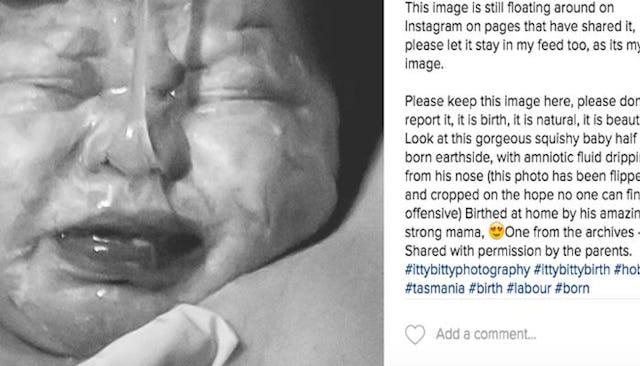Instagram Won't Stop Removing This Birth Photo

Photographer furious after Instagram censored stunning home birth photo
Birth is a beautiful and miraculous thing, but apparently not everyone sees it that way. That’s why one photographer is speaking out after she says Instagram took down a perfectly innocent birth photo twice for violating their “community guidelines.”
Photographer Jes Jackson of Itty Bitty Photography recently shared a stunning photo she took during a Hobart, Tasmania, home birth a few years ago. In the full image, Jackson tells Scary Mommy a birthing mom is on all fours with her baby’s head emerging from her body. The photographer wanted to share the image to highlight the “real, raw” beauty of the birthing experience, but she was nervous about censorship so she decided to crop the image to show only the baby’s face and the midwife’s hands instead.
Explained Jackson, “I uploaded the image four weeks ago with the caption, ‘Look at this gorgeous, squishy baby half born earth side, with amniotic fluid dripping from his nose (this photo has been flipped and cropped in the hope no one can find this offensive).'”
Jackson tells Scary Mommy the image got hundreds of likes and positive comments, and “some even said they shared it with their children,” but ultimately it was reported and deemed too graphic for social media. Within hours, Jackson was locked out of her Instagram account and got a message that read, “We removed your post because it doesn’t follow our community guidelines. Please read our guidelines to learn what kind of posts are allowed and how you can help keep Instagram safe.”
“I was furious,” Jackson recalled. “I was so angry and upset. How could someone be offended by this image? Why would someone report it? It was really hard not to take it personally.”
Jackson, who became a mom herself at age 16, says sharing birth photography is important to her because she wants to empower other women. “As a young mother, I was terrified of birth,” she said. “I had no experience other than scenes in big Hollywood films, and we all know how unrealistic that can be. I want people to be able to see, look at, and admire real, wholesome images of birth — images that show them strength and power, and that birth is normal and natural.”
With that in mind, Jackson uploaded the image a second time, but after receiving over 800 likes, it was removed again. She says there’s “no way” the image violated Instagram’s guidelines, and she even reached out to them for an explanation, but two weeks later, she’s yet to receive a response.
[shareable_quote]”I really feel that sharing images like mine can play a part in breaking down the negative stigma surrounding birth culture in our society.”[/shareable_quote]
“My image was an image I had taken, [and] it contained no sexual intercourse, no genitals, no buttocks, no nipples” Jackson said. “It fostered meaningful and genuine interactions. It was not spam, it followed the law, it was respectful, and it did not contain violence… I really feel that sharing images like mine can play a part in breaking down the negative stigma surrounding birth culture in our society.”
The photo was uploaded a third time, and so far it’s been up for a week with no take-down notices, but whether or not it will stay that way remains to be seen. Jackson is certainly not the first photographer to have birth photos censored on social media, and it makes you wonder, why is there such a stigma surrounding images of babies being born?
Like Jackson said, birth photos are not sexual in nature and they rarely show anything that could be construed as inappropriate. Why is it okay for Kim Kardashian to post nudes on Instagram, but images meant to empower and inspire women are deemed a violation of community guidelines?
If someone finds birth gross or graphic, that’s obviously their prerogative, but it doesn’t mean others should be prevented from sharing perfectly acceptable photos on their social media accounts. It just goes to show that our views about women’s bodies and reproductive functions are still so skewed, and we’ve got a long way to go towards changing society’s perceptions of the beauty of birth and motherhood.
This article was originally published on